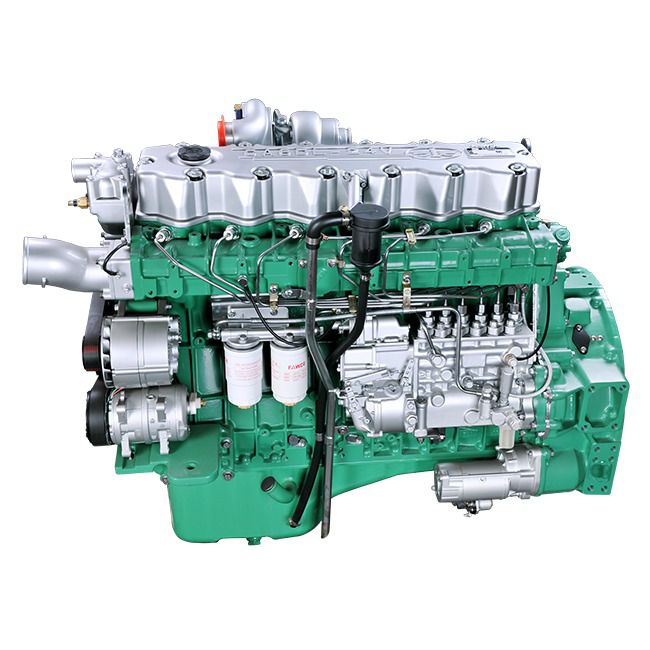Overview of Marine Diesel Engines: An Introduction to Marine Diesel Engines, How They Work and What They Mean in the Maritime Industry
introduce:
Marine diesel engines play a vital role in the maritime industry, powering a wide range of vessels, from small fishing boats to large container ships and cruise ships. These engines provide the propulsion necessary to traverse the world's oceans, enabling the movement of goods, passengers and resources around the globe. Understanding how and why marine diesel engines work is essential for anyone interested in the maritime field.
working principle:
Marine diesel engines operate on the principle of internal combustion. They convert the chemical energy of diesel fuel into mechanical energy, which is then used to drive the ship's propellers, propelling the ship forward. The process involves several key steps:
Air Intake: The engine draws a precise mixture of air and fuel vapor into the combustion chamber. The air is compressed to high pressure by the engine's pistons.
Fuel Injection: Diesel is injected into the combustion chamber at the end of the compression stroke. The high temperature and pressure of the compressed air causes the fuel to self-ignite (auto-ignition) without the need for a spark plug.
Combustion: The fuel-air mixture ignites, creating a rapid combustion process. This explosion creates high-pressure gases that force the engine's piston down, converting chemical energy into mechanical work.
Exhaust: Exhaust gases are expelled from the cylinder after the power stroke and the cycle repeats for the next combustion event.
FAWDE produces high-quality marine diesel engines, you can contact us if you have any needs!
Significance in the maritime industry:
Marine diesel engines offer several advantages that make them an integral part of the marine industry:
Power and Efficiency: Marine diesel engines are known for their high power output and fuel efficiency. They can generate a lot of torque and provide the propulsion necessary to move large vessels efficiently, even over long distances.
Reliability: Diesel engines are known for their reliability and durability. They can withstand the harsh operating conditions of a marine environment, including high loads, prolonged use and extreme temperatures.
Fuel Availability: Diesel fuel is widely used worldwide, making it a convenient choice for oceangoing vessels traveling through different regions and ports.
Safety: Compared to gasoline engines, marine diesel engines have a higher flash point, reducing the risk of fire or explosion. They are not easily ignited by fuel vapors, making them a safer choice for marine applications.
Environmental considerations: While marine diesel engines do emit pollutants, advances in engine technology and the use of emission control systems have greatly reduced their environmental impact. Additionally, the high fuel efficiency of diesel engines helps minimize greenhouse gas emissions and overall fuel consumption.
in conclusion:
Diesel boat motors are the workhorse of the marine industry, providing reliable and efficient propulsion for all types of vessels. Understanding how they work and recognizing their importance in the maritime sector is vital for shipbuilders, marine engineers, operators and anyone involved in the industry.
Marine diesel engines play a vital role in the maritime industry, powering a wide range of vessels, from small fishing boats to large container ships and cruise ships. These engines provide the propulsion necessary to traverse the world's oceans, enabling the movement of goods, passengers and resources around the globe. Understanding how and why marine diesel engines work is essential for anyone interested in the maritime field.
working principle:
Marine diesel engines operate on the principle of internal combustion. They convert the chemical energy of diesel fuel into mechanical energy, which is then used to drive the ship's propellers, propelling the ship forward. The process involves several key steps:
Air Intake: The engine draws a precise mixture of air and fuel vapor into the combustion chamber. The air is compressed to high pressure by the engine's pistons.
Fuel Injection: Diesel is injected into the combustion chamber at the end of the compression stroke. The high temperature and pressure of the compressed air causes the fuel to self-ignite (auto-ignition) without the need for a spark plug.
Combustion: The fuel-air mixture ignites, creating a rapid combustion process. This explosion creates high-pressure gases that force the engine's piston down, converting chemical energy into mechanical work.
Exhaust: Exhaust gases are expelled from the cylinder after the power stroke and the cycle repeats for the next combustion event.
FAWDE produces high-quality marine diesel engines, you can contact us if you have any needs!
Significance in the maritime industry:
Marine diesel engines offer several advantages that make them an integral part of the marine industry:
Power and Efficiency: Marine diesel engines are known for their high power output and fuel efficiency. They can generate a lot of torque and provide the propulsion necessary to move large vessels efficiently, even over long distances.
Reliability: Diesel engines are known for their reliability and durability. They can withstand the harsh operating conditions of a marine environment, including high loads, prolonged use and extreme temperatures.
Fuel Availability: Diesel fuel is widely used worldwide, making it a convenient choice for oceangoing vessels traveling through different regions and ports.
Safety: Compared to gasoline engines, marine diesel engines have a higher flash point, reducing the risk of fire or explosion. They are not easily ignited by fuel vapors, making them a safer choice for marine applications.
Environmental considerations: While marine diesel engines do emit pollutants, advances in engine technology and the use of emission control systems have greatly reduced their environmental impact. Additionally, the high fuel efficiency of diesel engines helps minimize greenhouse gas emissions and overall fuel consumption.
in conclusion:
Diesel boat motors are the workhorse of the marine industry, providing reliable and efficient propulsion for all types of vessels. Understanding how they work and recognizing their importance in the maritime sector is vital for shipbuilders, marine engineers, operators and anyone involved in the industry.


Comments
Post a Comment